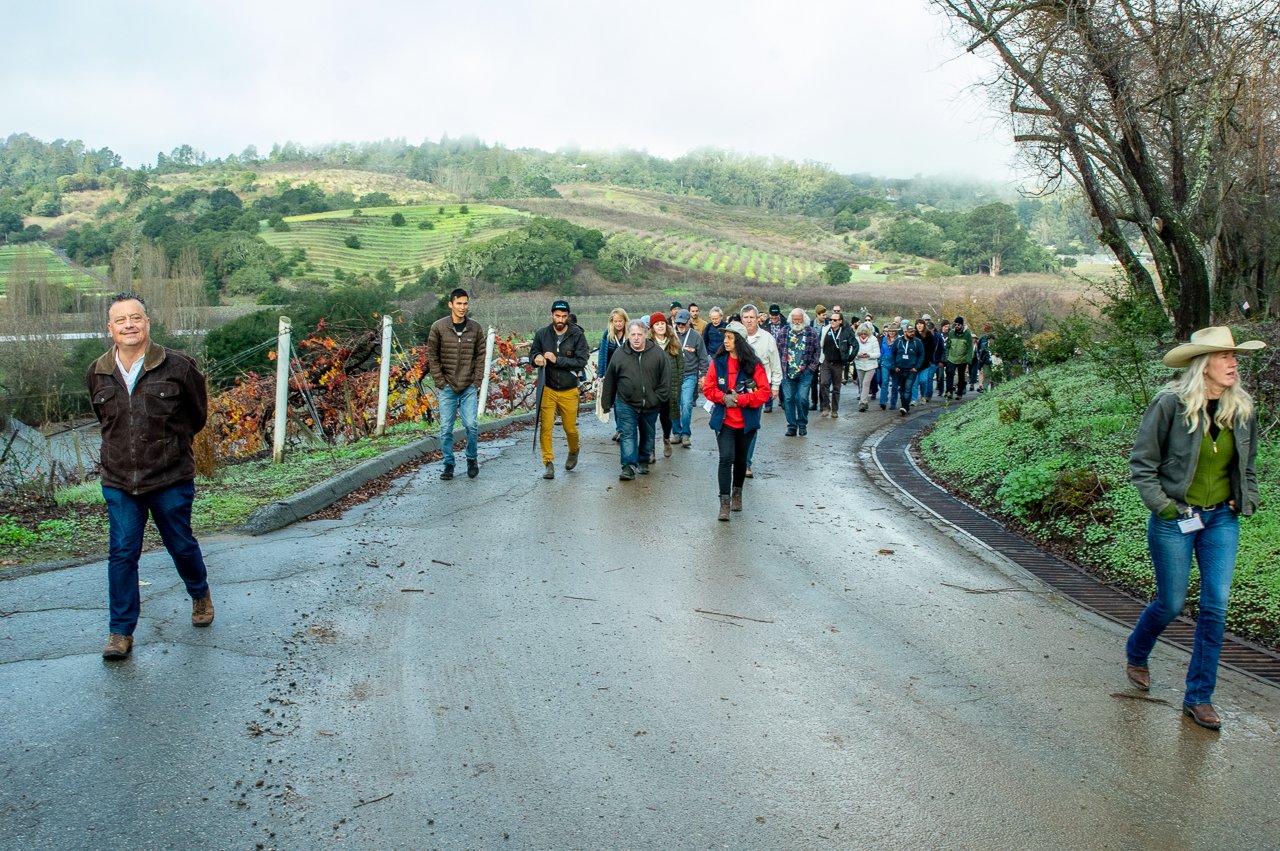Regenerative Grazing at Santa Lucia Conservancy
Tuesday, January 21, 2025
9:00 am - 4:00 pm (Includes an organic lunch)
Farms and ranches are more than places where food and fiber come from! Plants, animals and microbes all contribute to the farm ecosystem. Join the staff of the Santa Lucia Conservancy along with researchers and practitioners from across California to explore how management decisions can create healthy habitats for more than just production. We’ll begin with coffee and a discussion of principles, then continue in the field. Along the way we’ll wade through nature’s incredible complexity to choose the metrics that help us steer management towards healthy, functional landscapes. Lunch provided.
Cost: $130 | Location: Santa Lucia Conservancy
EcoFarm Bus Tour 2025
Wednesday, January 22, 2025
8am -6pm
California’s Inland areas of Aromas, Gilroy, and Morgan Hill enjoy hot summers and wet winters, fostering a wide range of crops suited to the climate and fertile soils. This annual EcoFarm bus tour is a unique experience to learn from farms leading innovative operations. Join us on this full-day tour to experience and understand organic agriculture in the region. You’ll visit Spade & Plow, 3 Feathers Farm, and Blossoms Farm (a biodynamic farm).
$135 -Includes lunch, The tour will begin and end at Asilomar.
Featured Farms
SPADE & PLOW
-
Spade & Plow Organics got its start by a father and two sons in 2015, with the fairly simple idea of connecting the consumer directly to the farmer. With population density creeping up and farmland dwindling in "The Valley of Heart’s Delight," the trio committed to preserving Santa Clara County agricultural land while growing the best tasting varieties of organic fruits and vegetables that the South Bay Area had to offer.
The farm's newest venture has come in the mighty transition from a largely-focused CSA operation to one centered around unique growing partnerships and wholesale distribution sales. After many years of month-to-month leases on multiple small plots of land, in 2020 the team had the privilege and fortune to secure a long-term 100 acre lease in Gilroy at the historically-rich Van Dyke Ranch. Both the operational and geographical transition has helped propel them into a new phase of production, preservation, and expansion.
The thread that has - and continues to - connect all of Spade & Plow's outlets, is the farmers market. You can find them at several on the coast and up the peninsula with a slew of unique, specialty veggies, pantry items, eggs, and a whole lot of (artichoke) heart!
-
3 FEATHERS FARM
-
The mission of Three Feathers Farm is grounded in the collective endeavor to reclaim ancestral ties to the earth and to transform the prevailing food system for our communities. With a steadfast commitment to agroecology and social justice, the farmers of this land strive to cultivate a future where all communities have access to healthy, culturally relevant foods that nourish both body and soul. Through their agricultural practices and community engagement initiatives, they seek to empower individuals to reconnect with their roots and to reclaim their rightful place within the food system.
As stewards of the land, the farmers of Three Feathers Farm recognize their responsibility to uphold the principles of agroecology and environmental stewardship. Through practices such as crop rotation, composting, and water conservation, they strive to minimize their ecological footprint and to promote the health and vitality of the land for future generations. In doing so, they honor the teachings of their ancestors, who understood the importance of living in harmony with the natural world
Three Feathers Farm is more than just a place where food is grown—it is a living embodiment of the values of sustainability, social justice, and cultural resilience. Through their dedication to honoring the wisdom of their ancestors and serving their communities with integrity and compassion, the farmers of Three Feathers Farm are forging a path towards a more just and equitable future for all. With each harvest, they sow the seeds of change, inspiring a new generation of BIPOC farmers and consumers to embrace the principles of sustainable agriculture and cultural empowerment. Together, they are cultivating a future where all people have access to the nourishment they need to thrive, and where the wisdom of the past guides us towards a brighter tomorrow.
-
BLOSSOMS FARM
-
Blossom’s Farm, founded in 2010 and recently relocated to Aromas CA, is a diversified, biodynamic farm organism that grows, processes, and produces nutrient-dense foods and herbal health and skincare products using restorative farming practices. Blossom's markets these products through their own farm store, farmers markets, and online. It is a vertically integrated business which executes all steps of production from the growing of vegetables and herbs to the value adding. Another component of Blossom’s Farm is Millefolium.org, a 501 c3 non-profit with the mission of hosting educational events, workshops and guest teachers.
-
Advancing Agroecology, Organic, and Sustainable Agriculture Education in California Universities and Colleges
Wednesday, January 22, 2025
9-4 pm
Asilomar Conference Grounds
$99 (lunch included)
A number of significant initiatives and programs are now running on campuses across California that center both educational equity and ecology in farming and food systems. This is a long row to hoe. The next generation of leaders have their own voices and visions. Educators are facing how to best support and facilitate their success. The day-long workshop is designed for sharing lessons learned, best practices, and visions for the future. This is an opportunity to come together and learn from each other, as students, staff, faculty, and administrators, as we work to create more equity and ecology in California agriculture and education. Speakers and participants will include students, staff, faculty and administrators from the University of California, California State University, and California Community Colleges. Participants will also include partner agencies and non-profits. The program will be facilitated by the UC Santa Cruz Center for Agroecology.
Practical Whole Farm Solutions for Pest Management Practitioners and Growers
Wednesday, January 22, 2025
8-5 pm
Asilomar Conference Grounds
$99 (lunch included)
A unique opportunity to learn a whole systems approach to pest management, this preconference addresses both soil health and habitat diversity on the farm. The target audience is PCAs, CCAs and growers of California agriculture. It covers techniques on how to reduce the use of pesticides and come into compliance with California's pesticide reduction strategy. Learn more about the sessions included in this pre-conference event below.
DPR and CCA continuing education credits will be applied for.
-
Julie Henderson, CA Director, Department of Pesticide Regulation
Pest management plays an integral role in the stability of California’s healthy food supply, the health of our communities and environment, and the maintenance of our infrastructure. Julie will share the recommendations in the Sustainable Pest Management (SPM) Roadmap released in January 2023 and how the Dept. of Pesticide Regulation is building on the Roadmap’s recommendations to accelerate a systemwide transition to sustainable pest management in California.
-
Dr. Hans Rudolf Herren, Entomologist, California Farmer and Development Specialist
Early in his career, Hans received the prestigious World Food Prize for his pivotal role in controlling the cassava mealybug with a parasitic wasp, a breakthrough that saved millions of lives. As a vocal advocate for agroecology, organic, regenerative, and other sustainable agricultural practices, he emphasizes the need for a paradigm shift. Hans argues that industrial, energy-intensive agriculture must transition into a multifunctional system that embraces a holistic, systems-based approach to both production and problem-solving.
-
Dr. William E. Snyder, Professor of Agroecology and Systems Biology, Univ. of Georgia
Bill’s 28 years of research demonstrates that stronger pest suppression can be achieved when natural enemies occupy diverse, complementary feeding niches across the farm. Whether it’s flowers, cover crops, groundcover due to reduced tillage, continuous habitat linkages, or plants that support alternate insect hosts or prey, these habitats collectively create a comprehensive blanket of attack. A diversity of niches also decreases the likelihood of intraguild predation, where beneficial organisms prey on each other.
-
Dr. Margaret Lloyd, Small Farms Advisor, UCANR
Gerald Davis, Retired Agronomist and PCA for Grimmway FarmsNon-chemical strategies should be the first line of defense against soilborne pests. These include building disease-suppressive soils through amendments, residue management, crop rotation,
and reduced soil disturbance. Margaret will discuss studies on these methods, and on inducing systemic resistance, which strengthens plant defenses against pathogens. Drawing on decades of experience managing 35,000 acres of organic production, Gerald will share his crop rotation strategies, composting methods, and other fertilization techniques that enhance soil health and reduce insect pest and disease issues.
-
Kim Horton, Agronomy Manager, Taylor Farms
Dr. Dylan Beal, Entomology Farm Advisor, UCCEEmploying cover crops, optimizing plant nutrition, fostering beneficial insect habitats, releasing beneficials, and protecting them from pesticides all aid in managing vegetable pests. This session brings together an in-house agronomist and an extension entomologist with broad experience to discuss these strategies, and to specifically cover the biology of Diamondback Moth and its management.
-
Dr. Matt Grieshop, Director, Grimm Family Organic Center at Cal Poly
Gina Bella Colfer, Sustainability PCA/CCA, Wilbur-EllisTogether, Matt and Gina will explore the benefits and limitations of organic fungicide and insecticide biocontrol products, focusing on their efficacy, environmental impact, and compatibility with organic farming practices. Attendees will gain insights into selecting and integrating these products to optimize pest management in organic systems.
-
Moderator: Richard Smith, Emeritus Farm Advisor, UCCE
Dr. Darryl Wong, Executive Director, Center for Agroecology and Sustainable Food System at UCSC
Curtis Garner, Cofounder, Verdant Robotics
Nathan Dorn, Agricultural Business Development Lead, Farm-ngWeed control practices aimed at minimizing weed populations include cultural methods like crop rotation and pre-irrigation, as well as mechanical approaches such as flaming and cultivation. Today, advanced technologies using cameras, weed recognition systems, and automated killing methods are also available. What role does this technology play in vegetable production, and can it be effective for smaller farms? In this session, a grower and representatives from two companies offering high-tech weed control solutions will discuss the benefits and drawbacks of these innovations.
-
Dr. David Headrick, Professor, Cal Poly San Luis Obispo
Jessica Vaughan, Vaughan Grower ConsultingScouting is as important to successful crop production as watering. David will discuss the concepts behind pest population fluctuations, how to establish pest thresholds for organic production and what methods are appropriate for low-density or high-density pest populations. The Whole-Farm Scouting method puts theory into practice by capturing comprehensive scouting data, determining site-specific pest thresholds, and analyzing the data to help make informed farming decisions for successful crop production. As a practicing crop consultant, Jessica will share real life examples of these methods.






